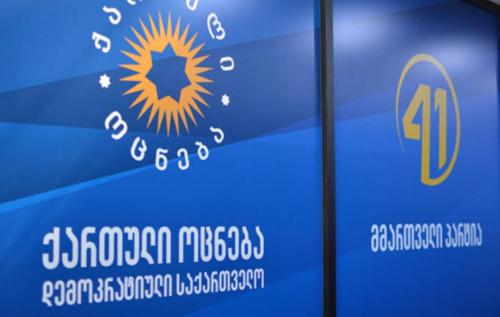“No sanctions can intimidate the Georgian people, as society well understands that no sanctions can compare to the destruction of the country. Therefore, no one can force Georgia’s government, at any cost of sanctions, to curse the country into a devastating war,” reads the statement of the Georgian Dream Political Council.
The statement reads that the Georgian people will not allow the Ukrainization of Georgia at any cost of sanctions.
“Georgia has so far escaped the Ukrainian scenario through great effort and uncompromising struggle, however, the fight for peace continues and this fight must be seen through to the end. As long as there is a first front in Ukraine, there will always be interest in a second front in Georgia. This is exactly what the sanctions are related to, which, dictated by the global war party and implemented by the Deep State, specific countries impose on Georgian politicians and officials.
The Georgian people must fight to the end to survive and prevent the Ukrainization of Georgia. By doing this, we will also do a good service to Europe, where the majority of countries today are playing the Deep State’s game and failing to protect their own national interests.
The value system of EU bureaucracy is in its worst state today, which is best expressed by five resolutions adopted by the European Parliament regarding Georgia. Through these resolutions, the European Parliament demanded the punishment of Bidzina Ivanishvili, the release of Saakashvili and other criminals, the repeal of the anti-LGBT propaganda law, etc.
With the last, fifth resolution, the European Parliament demanded what no serious player had dared to demand publicly before – imposing sanctions on Russia and collapsing the Georgian economy. Given this trend, in the sixth resolution, the European Parliament will, with high probability, openly demand that we start a war with Russia.
The formal basis for sanctions imposed by specific states is completely unserious, and this requires little evidence. Bidzina Ivanishvili is being sanctioned for replacing bloody authoritarianism in Georgia with democratic governance, for ending the systematic practices of torturing and killing people, extorting businesses, seizing media, and rigging elections, for increasing the country’s economy from 28 billion to 90 billion, and for bringing 12 years of uninterrupted peace to Georgia.
Vakhtang Gomelauri and heroic police officers, including those who fought in the 2008 war, are being sanctioned because they effectively prevented three violent attempts to overthrow the government in the last two years and did so in such a way that not only was there no loss of life, but not even a single person’s health was affected.
In contrast, we all remember the May 26 and June 20 special operations of the global war party and Deep State’s favourites, Merabishvili and Gakharia, which ended in one case with the murder of 4 people, and in the other case – with severe injuries to 7 people. Let us remind you that neither Merabishvili nor Gakharia was ever considered for sanctions because the Deep State was guided by Roosevelt’s famous quote – “He’s a son of a bitch, but he’s our son of a bitch.”
It’s logical that those who coddle “sons of bitches” sanction heroic police officers. We all remember that the dictator Saakashvili, who initiated the 2008 war with Russia, was crowned by the Deep State as a hero and beacon of democracy.
Logically, the global war party does not spare praise for the agent of war. It is a continuation of this logic that the Deep State punishes Bidzina Ivanishvili for peace.
Georgian society discerns all of this very well, and that is precisely why the Deep State’s sanctions have lost all power in Georgia. It is noteworthy that sanctions against Georgia were first imposed by the Ukrainian government, whose highest officials openly called on the Georgian government to open a second front. This was followed by sanctions from the Baltic states, which have practically completely lost their sovereignty and have to act entirely at the dictation of the Deep State.
The demand and threat once voiced behind closed doors has finally taken on a public face. “Either you fight or we’ll punish you” – this is the simple message that Georgia and the Georgian people receive from the global war party.
Moreover, through the opposition’s voice, they started talking about punishing the Georgian people, which is a sure sign that even more than the government, the global war party is irritated by the uncompromising position of the Georgian people, who did not allow the return to power of the collective National Movement, that is, the global war party’s agents, and Georgia’s re-involvement in war.
Finally, no one can intimidate the Georgian people with any sanctions, because society well understands that no sanctions can compare to the destruction of the country. Therefore, no one can force Georgia’s government, at any cost of sanctions, to curse the country into a devastating war. The Georgian people will not allow the Ukrainization of Georgia at any cost of sanctions,” reads the GD Political Council’s statement.

